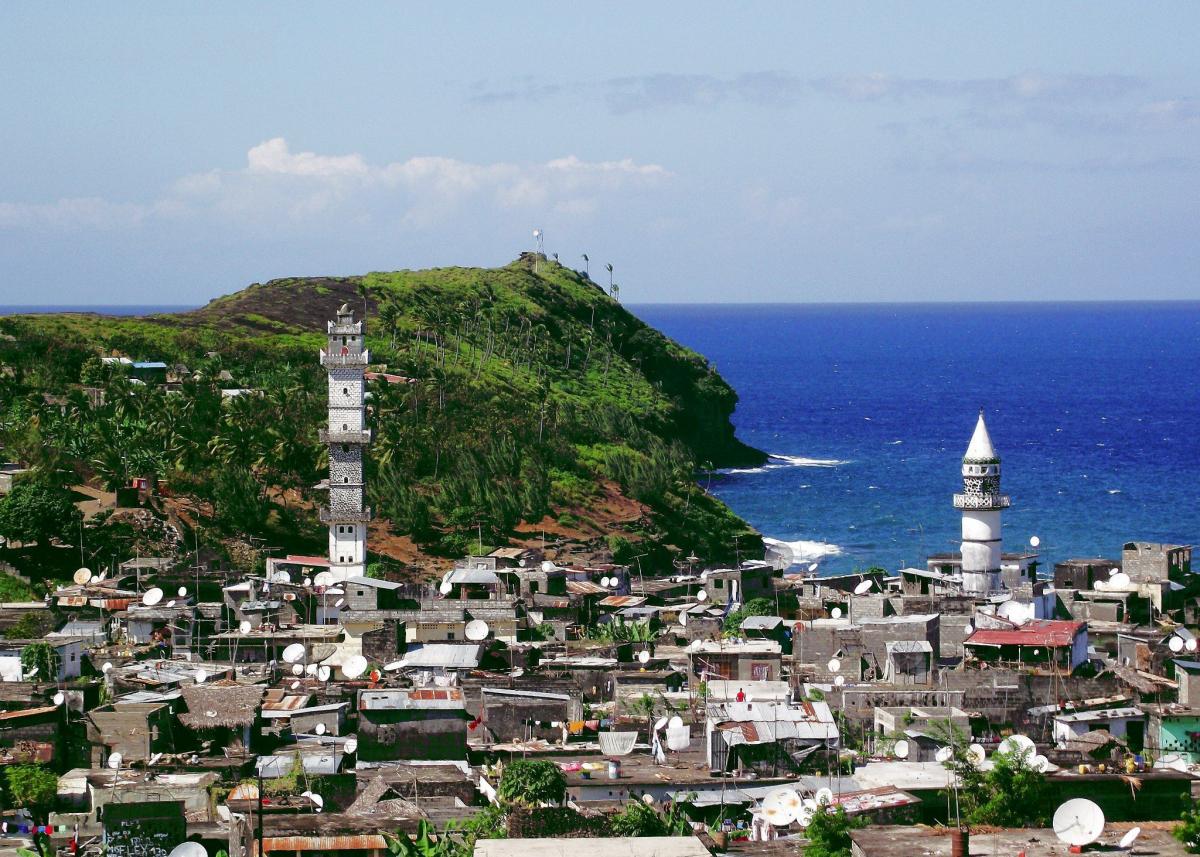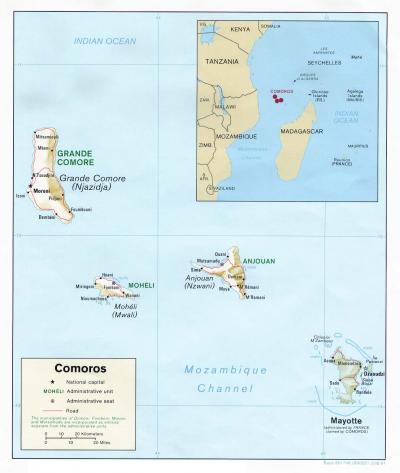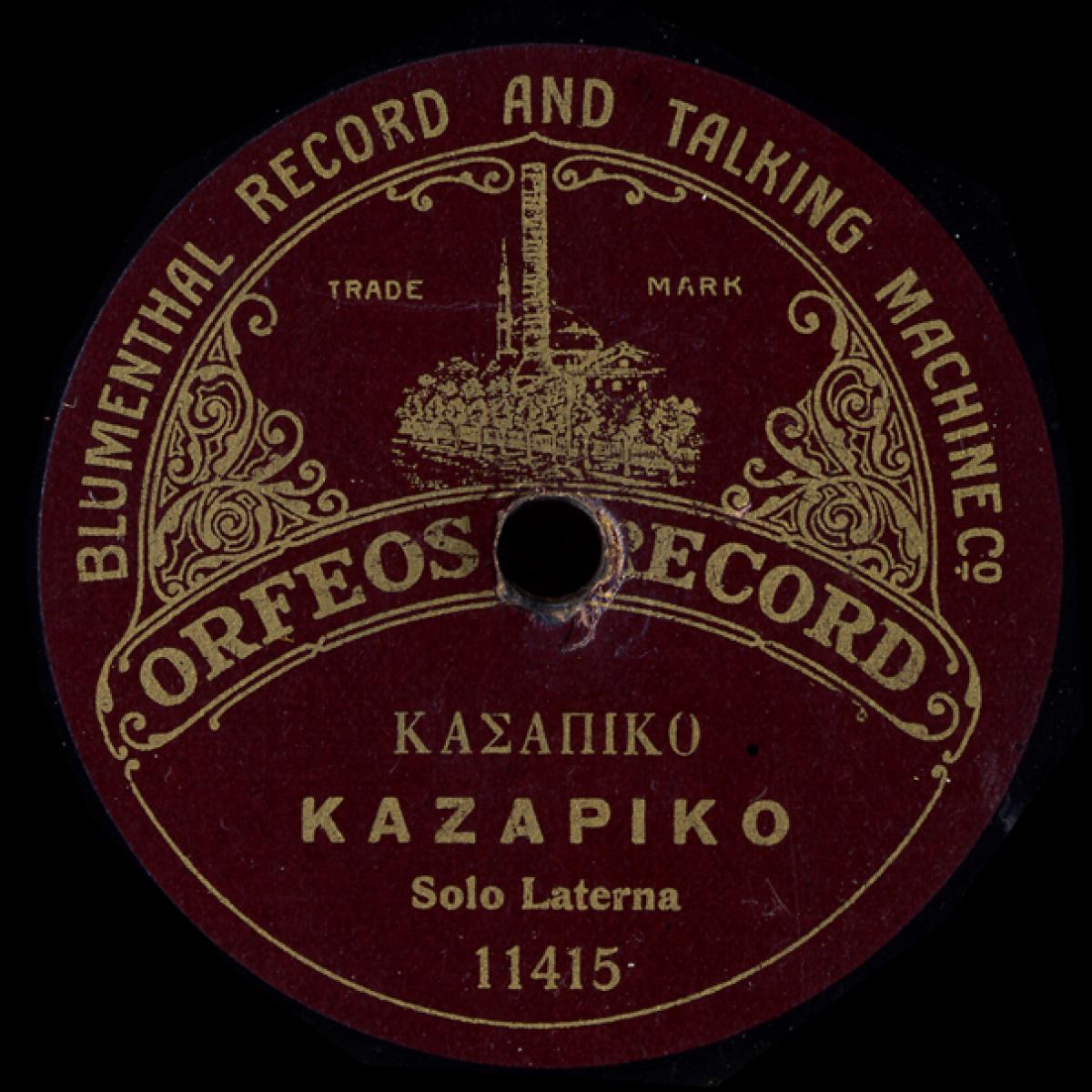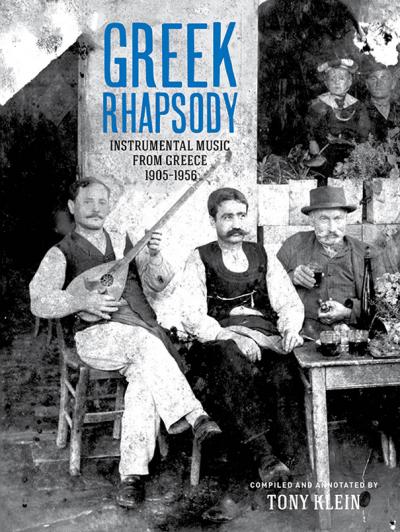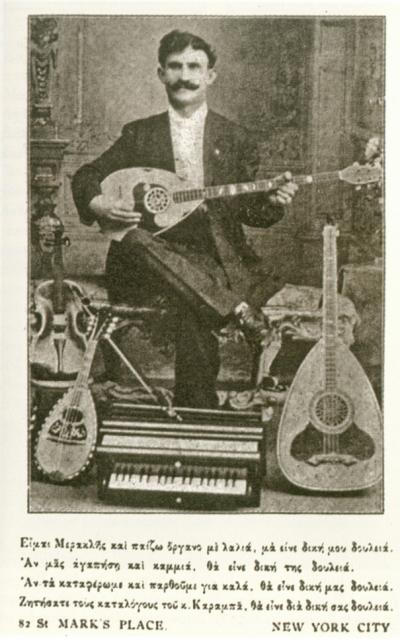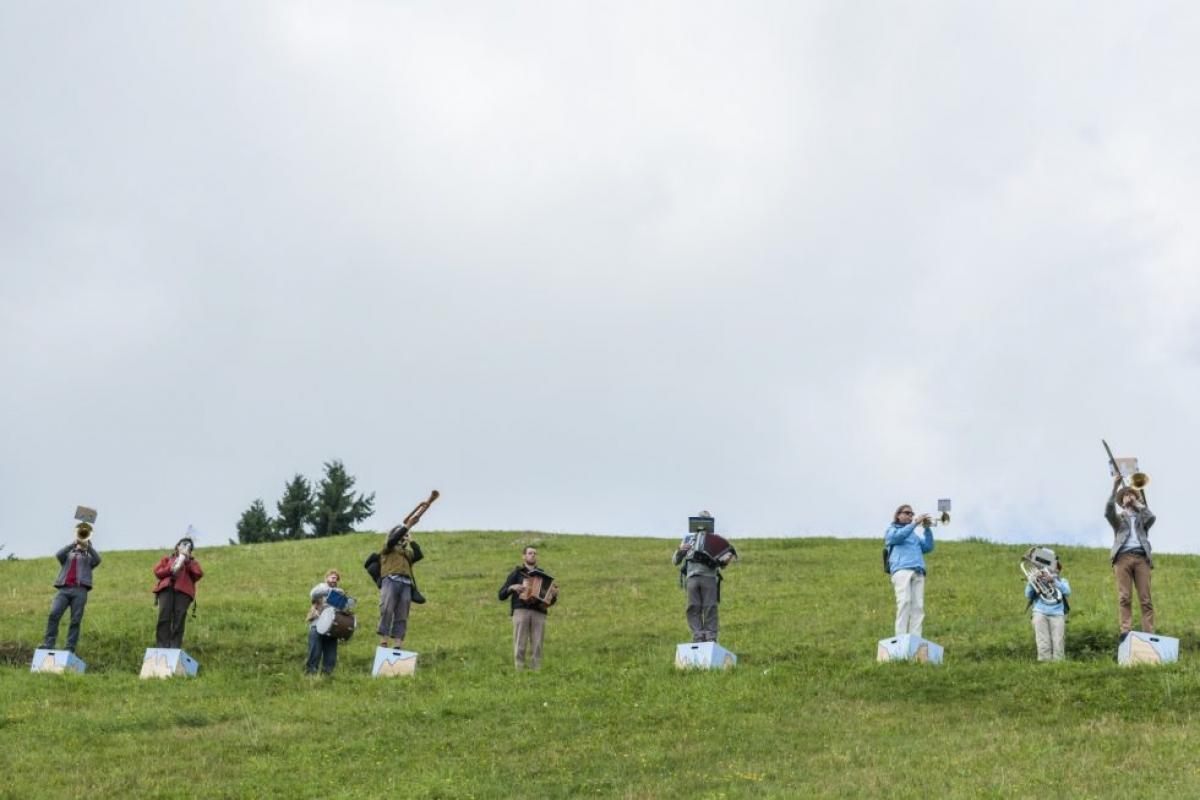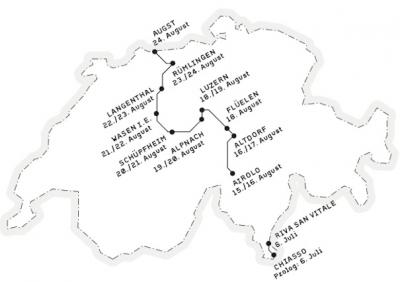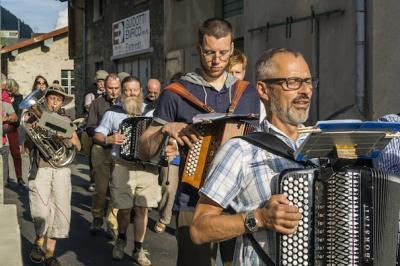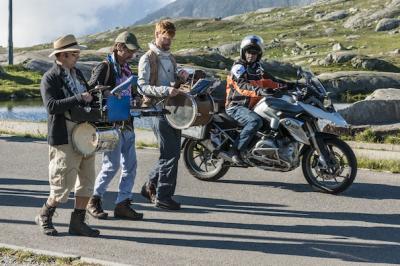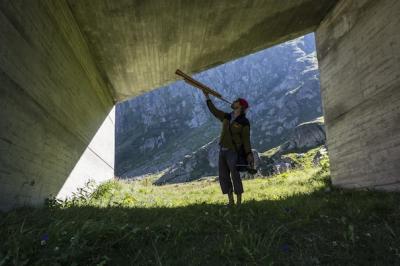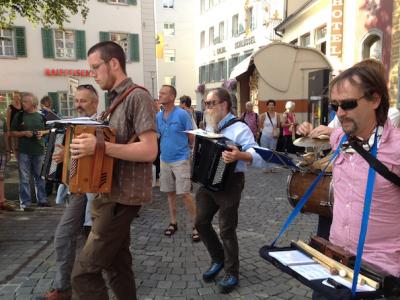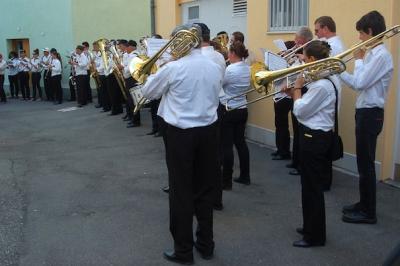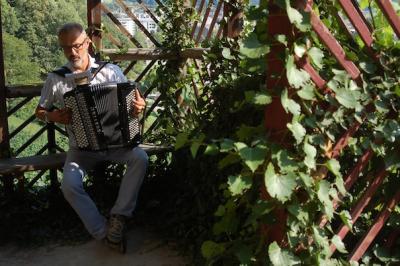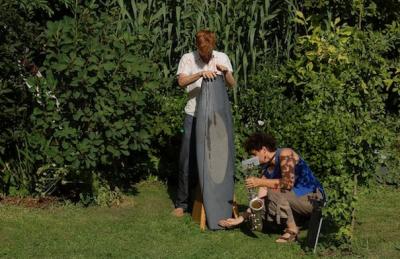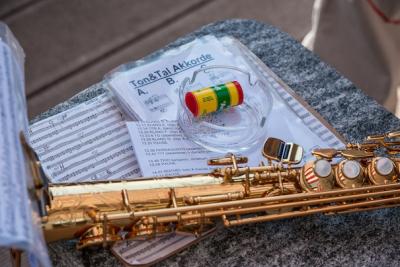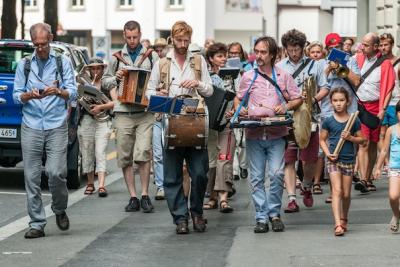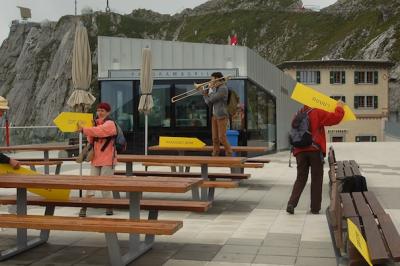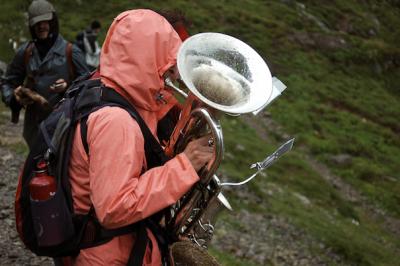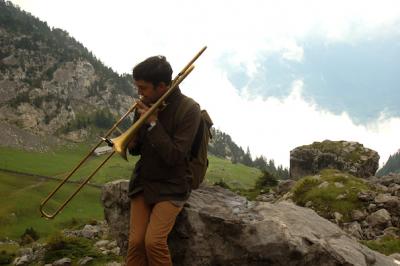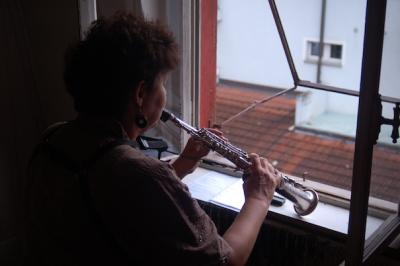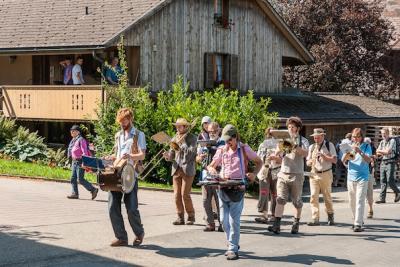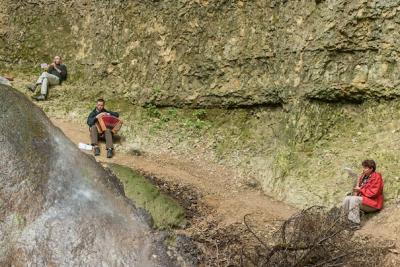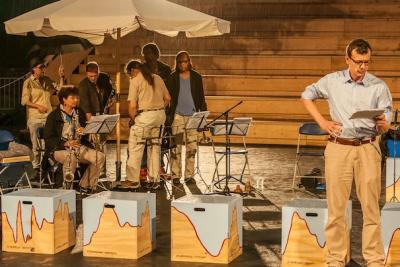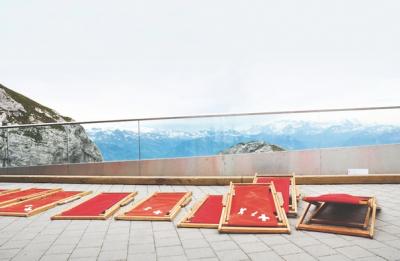13 Musikerinnen und Musiker wandern in 10 Tagen von Süd nach Nord durch die Schweiz und verlagern das Festival Neue Musik Rümlingen auf 50 Klangevents zwischen Ton&Tal. Die Ensemblemitglieder sind zu Fuss, per Bus, Zug, Traktor, Schiff und Gondelbahn unterwegs – und treten mit den Soundscapes und lokalen Musikerinnen und Musikern der verschiedenen Stationen in einen mal improvisierten und mal komponierten Dialog. Norient wandert mit und berichtet in einer Multimedia-Reportage.
6. Juli/6 Luglio
PROLOG: La Via Lattea 10, Compagni di Strada CHIASSO – Mendrisio – Riva San Vitale 1
5. August/15 Agosto
AIROLO
16. August
AIROLO – San Gottardo – Hospental – Erstfeld – ALTDORF
Ich treffe in Altdorf auf Ton&Tal, das Festival auf Wanderung. Die Ankunft des Expeditionsensembles kündigt mir eine historische Jahrmarktsorgel an. Schon seit seiner Kindheit kennt Henning Ballmann die über hundertjährige Orgel, die ihm der Besitzer später überliess. Ballmann wurde zum Sammler und kümmerte sich um die Restauration. Damit war die Orgel bereit, mit neuen Kompositionen (u.a. von Daniel Ott, Ruedi Häusermann, Francois Sarhan und Heinz Holliger) gespeist zu werden. Ballmann hat sie auf die Lochpapierrollen gestanzt – diese Oldschool-Speichermedien lassen die Kompositionen wie von Geisterhand erklingen. Es sind charmant-unheimliche Miniaturen voller anachronistischem Zauber, die musikalisch auf Zirkus, Jahrmarkt und Karneval referieren, den Wind einkomponieren oder völlig abstrakt sind. Einerseits konnten sich die 10 Komponisten austoben: zuverlässig wie kein menschlicher Interpret spielt die Mechanik rhythmisch komplexe Tongebilde oder lässt auf Befehl alle Töne gleichzeitig erklingen. Andererseits waren die Komponisten limitiert: nicht alle Töne der Orgel funktionieren.
Die 13 Wandermusikerinnen und -musiker versammeln sich auf dem Lehnplatz. Die Sonnenstrahlen haben sie von den Gotthardhöhen mitgebracht – ihre gebräunten Gesichter und zersausten Haare lassen die Gäste des Festivals Alpentöne erahnen, welchen Weg sie an diesem Freitag bereits hinter sich gelassen haben. In Altdorf kreuzt der illustre Schwarm das Alpentöne Blasorchester, das anmutig durch die Gassen schreitet. In die experimentellen Klänge des Ton&Tal-Ensembles schleichen sich Ländler, Stromkästen werden zu Schlagzeugen, Klangflächen verschmelzen.
Da sitzen Ton&Tal ganz zivil Ton in Ton (beige, hellblau und rot lautet das Konzept) und stellen sich dem Alpentöne-Publikum in aufregenden Soli vor. Die Kompositionen nehmen die bevorstehende Route imaginär vorweg, dazu liest Tim Krohn seine wunderbar schmunzeligen Texte zu den einzelnen Stationen.
Am Samstag bleibt Ton&Tal beim Festival Alpentöne zu Gast und beklingt mit Bläsern von den Altdorfer Türmen, sanfter Percussion, Akkordeon und Saxophon den Klostergarten. Der Komponist und Natur-Arrangeur Daniel Ott entwickelt dieses Schauspiel mit einer Ruhe, die sich auf die Zuhörer überträgt – das Knistern der Kiesel, das Zwitschern der Vögel und die fernen Klänge von der Strasse schmiegen sich ein, die Hörwahrnehmungen sind erweitert. Was ist inszeniert? Was ist Zufall? Ist auch der Traktor in weiter Ferne auf die Sekunde bestellt?
Am Abend im Theater Uri dann ein Konzert, das den Tag destilliert. Das Ensemble Ton&Tal spielt zusammen mit dem Alpentöne Blasorchester, nimmt Soundaufnahmen von den Stationen und Texte von Tim Krohn auf. Ganz schwindelig macht die Komposition «Gipfel» von Michael Riessler, die erst wie ein Schneeball den Berg herunterrollt und dann apokalyptisch-alpin endet:
17./18. August
ALTDORF – Flüelen – Brunnen – LUZERN
Mit Pauken und Trompeten zieht Ton&Tal heute weiter nach Luzern. Die Musikerinnen und Musiker lassen Klangwolken vorüberziehen und freuen sich auf die plätschernden Stunden auf dem Vierwaldstättersee:
In Luzern verzögert sich die Audienz beim KKL. Pünktlich um 18.00 Uhr heben die Bläser des Lucerne Festival Orchestra zu revolutionären Tönen an, doch der Nauen findet keine Anlegestelle: das KKL-Gewitter muss unbeantwortet bleiben. So neugierig das Publikum auf dem Europaplatz, so skeptisch blicken später die Passanten, welche die Prozession zum Bahnhof ziehen sehen. «Wer wird hier beerdigt?» «Was machen die da?» werde ich gefragt, «Hudigäggeler» ruft einer und ein Ehepaar berät sich, ob denn die Musiker schon «richtig» angefangen haben zu spielen oder «nur» ihr Instrumente stimmen. Viele andere sparen sich die Kommentare und schliessen sich lächelnd dem Schwarm an. Die Passanten am Bahnhof lassen sich kaum aus ihrer Geschäftigkeit reissen - nur einige Touristen zücken reflexartig ihr Handy, filmen das bunte Treiben oder posieren vor den Musikern.
Ton & Tal, Klangaktion am Bahnhof Luzern:
Beim Marsch durch die Stadt haben die Musikerinnen und Musiker ihren Blick immer fest auf die Noten und die Stoppuhr gerichtet, ihre regelmässigen Schritte bilden den Puls ihrer Musik. Die Komponistinnen und Komponisten sind die Strecke zuvor abgelaufen und haben den verschiedenen Stationen Stücke auf den Laib geschneidert. Das was nun dort auf die Marschgabel geklemmt ist, ist aber nur in wenigen Fällen ausnotiert. Eher steht auf den Zetteln eine Abfolge von Akkorden, zu sprechende Wörter oder Sätze, Anweisungen und Bewegungen – oder aus einem genauen Zeitraster, das die Musiker mit bestimmten Improvisationen füllen müssen.
In der Pfistergasse unterbechen Studierende der Hochschule Luzern den Ton&Tal-Marsch und Anwohner senden Störgeräusche aus den Fenstern - das sonst so museale Ambiente der Strasse verändert sein Gesicht, beginnt zu leben. Der Umzug geht weiter zu einer Autobahn-Unterführung voller Graffittis, die heute ihre inneren Werte preisgibt: ihre charaktervolle Akustik. Das Stimmorchester legt los mit einer Performance, die das ganze Spektrum an Stimmgeräuschen ausschöpft, die Ton&Tal-Musikerinnen und Musiker setzen in die Improvisationen der sieben Frauen ein. Bei dieser Klangaktion müssen die Velofahrer abbremsen: Eigentlich sind sie es sich gewohnt extra nochmal in die Pedale zu treten, um diesen «Unort» schnell hinter sich zu lassen.
19. August
LUZERN – Pilatus – Alpnachstad – ALPNACH
Heute gönnen sich nicht nur einige Musiker einen freien Vormittag, auch das Wetter spielt bei Ton&Tal nicht mit. Das Abtauchen in den Nebel per Pilatusbahn ist mein magischster Ton&Tal-Moment: Shirley Anne Hofmann und Christophe Dufaux spielen ein intimes Ständchen mit einer ganz eigenen Holper-Dramaturgie:
Oben auf dem Pilatus braucht es das Auge zum Hören: Zur Musik diskutieren gelbe Schilder stillschweigend über die Grenze zwischen Lärm und Musik, sie orten die Schallwellen, nehmen Gedanken vorweg. Die asiatischen Touristengruppen sind kaum am Mitdiskutieren interessiert: fast wirkt es so, als empfänden sie die Aktion als einen ganz selbstverständlichen Teil des Pilatus-Panoramas.
Beim Abstieg nach Ämsingen rauscht der kalte Atem durch die Gewinde der Blasinstrumente – und das Wetter singt im fortissimo mit: das Pfeifen des Windes, die Schritt auf den feuchten Steinen, der Niesel, der Regen. Nicht nur die Kuhglocken sind Teil der Polyphonie, auch das Knistern der Regenponchos tönt mit ein bisschen Imagination wie ein Jazzbesen auf einem Becken. Die Musikerinnen und Musiker verteilen sich auf dem Weg, wandern tapfer weiter...
...und suchen sich ihre Plätzchen im Nebel, auf ein Tête à Tête mit der Umgebung. Sie halten ihre Töne lange aus, lassen viele Pausen, entfachen das Echo, nehmen sich zurück. Ist es Ehrfurcht vor dem Berg?
Manchmal braucht die Idylle einen Bruch, damit sie nicht weh tut: kurz vor der Mittelstation zieht sich ein Nebelfeld zusammen und die rote Zahnradahn raupt vorbei. Eine schwermütige Nebelfeldforschung entwickelt sich, von der am Schluss nur die Kuhglocken und die volltönige Strommast-Percussion von Christian Dierstein bleiben.
Von Musik durchnässt trifft Ton&Tal in Alpnach ein und verteilt sich auf die 15 Zimmer des Kulturgasthauses Pfistern zur Solo-Meditation. In den Gängen des knacksenden, zerlebten Hauses laufen alle Monologe zu einer poetischen Collage zusammen. Diese ist nicht ganz dem Zufall überlassen, sondern genau durchgeplant. Auch wann die Musiker essen dürfen, ist in diese Komposition eingeplant (das hat aber eher logistische als künstlerische Gründe).
Teil der Installation ist auch eine Quintettformation der Horngruppe Obwalden, die – gerade weil sie so göttlich wäldlich spielt – etwas undankbar im Eingangsbereich platziert ist. In einer Pause erzählen mir die Musiker, dass ihr Verein aus Berufsmusikern, Musikstudenten und Laien besteht, er in der ganzen Region unterwegs ist und seit 1997 das Internationale Hornfestival in Obwalden organisiert. Die Installation in den oberen Räumen des Hauses haben die fünf Männer nicht angeschaut – die Welten zwischen der vorbeiziehenden Neuen Musik und den lokalen Musikern scheinen weit auseinander zu liegen. Musikalisch manifestieren sich diese Unterschiede beim Auszug des Ensembles Ton&Tal Richtung Sarnen – und haben durchaus ihren Reiz:
20. August
Glaubenbergpass – Schwarzenbergchrüz – Heiligkreuz – SCHÜPFHEIM
Heute geht es mit dem Traktor ins Entlebuch. Ein Sänger vom Jodelklub Schüpfheim hat eine Holzladefläche an seinen Traktor gekuppelt und fährt frohen Mutes den Forstweg hinauf. Geladen hat er ein Ensemble, das schon ziemlich erschöpft ist von den vergangenen Expeditionstagen und gerne etwas durch die Landschaft geschaukelt wird. Bei einer engen Kurve verstummt die musikalische Fracht: der Abhang ist verdammt nah, das Loch in der Strasse verdammt tief. Am Schwarzenbergchrüz, wo das Alpenpanorama zur Partitur wird, sind die Beine wie Gummi. Sie müssen jetzt aber noch laufen bis zur Wallfahrtskirche Heiligkreuz.
Nach einem Zvieri geht es am Waldrand entlang den Pilgerweg nach Schüpfheim hinunter. Auf die weissen Wegkreuze sind Noten geheftet: die Musikerinnen und Musiker gruppieren sich und spielen die in Töne übersetzen Höhenprofile der Ton&Tal-Expedition. Wie hier das Auf und Ab der Strecke nach Altdorf:
Die letzten Meter nach Schüpfheim legen die Musikerinnen und Musiker in einem sportlichen Slalom auf der Skipiste beim Sessellift zurück. Kein Schnee dort, aber frisch gemähtes Gras. Der Jodlerklub Schüpfheim und die Tambouren der Musikgesellschaft Schüpfheimhaben sich in zwei Gruppen geteilt und feuern die Ton&Tal Musikerinnen und Musiker an. Den Slalomparkour meistern sie höchst sportlich und individuell, der Empfang am Ziel: frenetisch. Die Jodler und Tambouren in ihren Trachten können den Abend nicht mit Ton&Tal verbringen - die meisten müssen zurück auf ihren Bauernhof, wo sie (besonders wochentags) allerlei Verpflichtungen haben - erzählt mir Jodlerklub-Leiterin Bernadette Ross-Stadelmann.
Die Dirgentin des Jodlerklubs Schüpfheim Bernadette Roos-Stadelmann im Interview: «Das ist ein wenig heile Welt hier»
Wie im Kulturgasthof Pfistern werden auch die Räume des Entlebucher Hauses mit Klängen gefüllt: Die Route Schwarzenbergchrüz – Heiligkreuz – Schüpfheim steckt nicht nur in den Gliedern, sondern auch in den aufgestellten Lautsprechern. Die Musikerinnen und Musiker spiegeln die Soundscapes, verstärken sie musikalisch – ein berührendes Echo am Ende eines in der Abenddämmerung versinkenden Tages.
21. August
SCHÜPFHEIM – Trubschachen – Napf – Riedbad – WASEN i. E.
Heute Mittwoch durchquerte das Ensemble Ton&Tal des Festivals Rümlingen klingend das Napfgebiet von Trubschachen bis nach Riedbad. Und im Anschluss daran kam es in Wasen im Emmental zu einer Begegnung, wie es wohl nur dieses Festival wagen würde: das ganze wirkte jedenfalls recht sürreal. Das Ensemble begleitete nämlich das Training der Hornussergesellschaft Wasen-Lugenbach mit seinen Klängen. Entsprechend zu den kurzen schwirrenden Abschlaggeräuschen der Hornusser setzte es kurze Töne in die Landschaft.
Hinzu kam schliesslich das Spiel der Musikgesellschaft Wasen, die zunächst aus der Ferne spielten und dann allmählich näher kamen. Gestaltet hatte das musikalisch Jonas Kocher. Hier ein Klangeindruck von diesem Training.
Ob diese Begegnung etwas gefruchtet hat? Ob diese beiden Welten nicht zu unvereinbar sind?
22. August
WASEN i. E. – Oberwald – Geri – Huttwil – LANGENTHAL
23. August
LANGENTHAL – Fähre Wolfwil – Olten – Buckten – RÜMLINGEN
Einen Höhepunkt des vorletzten Tags, ja vielleicht der ganzen zehntägigen Reise durch die Schweiz bildete die Fährquerung über die Aare bei Wolfwil. Von Langenthal herkommend gelangten das Ensemble tonundtal und seine BegleiterInnen ans Ufer der Aare, wo jeweils ein/e MusikerIn mit kleinem Publikum übersetzte. Von beiden Seiten wurden sie dabei musikalisch unterstützt. Allein das war wunderschön, aber die Fahrt selber wurde für zwei, drei Minuten zu einer melancholischen Reise in die Mitte der Welt: Zwischen Quelle und Meer mitten auf dem Fluss, umgeben von Klängen.
24. August
Sommerau – Giessen – Rünenberg – Olsberg – AUGST
Der Samstag zeigte uns zum Abschluss der Rümlinger Wanderung, wie es hätte sein können, wenn uns Petrus in diesen zehn Tagen nicht verwöhnt hätte: Konzerte unter Schirmen, abgebrochene Wanderungen, vor strömendem Regen flüchtende Musiker und Zuschauer. Dabei zeigte er sich selbst da noch gnädig und liess nur einmal den Donner rollen, als sich am Samstagmittag eine kleine Gruppe mit dem Ensemble ton und tal hinaus zum Giessen-Wasserfall nahe Rümlingen begab. Die Musiker suchten Schutz unter vorspringenden Felsen und konnten dort einigermassen sicher. Nur die beiden Perkussionisten trauten sich ins Nasse und begannen damit zu spielen, warfen zum Beispiel Steine und Äste ins Wasser, plantschten im Rhythmus und experimentieren: Wie klingt es, wenn man eine Pellerine unter den Wasserfall hält? Das Publikum spannte die Schirme auf, mixte also hörend Regentropfengetrommel mit der Musik und lauschte geduldig. Eine Klangerfahrung wars allemal, aber an eine Wanderung danach Richtung Augst war dennoch nicht zu denken.
Abends lichtete sich der Himmel, liess ein wenig Sonne durch und so durfte man sich zumindest an die spektakulärste Aktion der ganzen Reise wagen: an Roman Signers «Der Pianist, ein Flügel, von einem Helikopter bewindet». Aber auch dieser Aktion war anzumerken, dass weitere himmlische Unbill drohte. Nur kurz (zu kurz wohl in der zeitlichen Proportion des Ganzen) hatte Stefan Wirth auf dem Flügel gespielt, als auch schon der Helikopter aus der Ferne heranflog und sich über Minuten hinweg langsam von oben kreisend dem Flügel näherte.
Von der Musik war im Schwirren des Hubschraubers bald nichts mehr zu hören. Selbst der furchtlose Musiker war da akustisch im «Blindflug» unterwegs. Eine herrlich absurde Situation ergab sich daraus: Die zugedröhnte Musik, ein schräges Äquivalent zu Stockhausens berühmtem Helikopter-Quartett. Am Schluss landete der Helikopter, Wirth stieg ein und entschwand den Blicken der Zuschauer.
Danach sollte im Theater von Augusta Raurica (wie in Altdorf schon) die «Gipfelmusik» des Ensembles zu den Texten von Tim Krohn (gelesen von Herwig Ursin) folgen, allein, der Regen setzte nach einigen Minuten so heftig ein, dass an ein Weitermachen nicht zu denken war und das Konzert abgebrochen wurde.
Wundersamerweise fanden sich aber kurz darauf Ensemble und Publikum im Zelt ein – und dort konnte das Ganze glücklich weiter- und zuendegehen. Was allerdings hätten wir in solchen Situationen an den anderen Stationen unserer Reise gemacht?
Mit einem Gang trockenen Fusses zum Kraftwerk und einem fast schon rituellen Feuer von Lukas Berchtold auf der Grenze zu Deutschland endete «Ton und Tal» mitten auf der Rheinbrücke.
Mit: Shirley Anne Hofmann (Blasinstrument Euphonium, Trompete und Akkordeon), Peter Schärli (Trompete), Balthasar Streiff (Alphorn, Büchel), Hans Hassler (Akkordeon, Klarinette), Christoph Brunner (Schlagzeug), Benjamin Brodbeck (Perkussion), Christian Dierstein (Schlagzeug), Christophe Dufaux (Akkordeon), Marcel Oetiker (Schwyzerörgeli), Stephen Menotti (Posaune), Hans Koch (Holzbläser), Samuel Stoll (Waldhorn), Co Streiff (Saxofon).
Komponist/innen: Annette Schmucki, Urban Mäder & Daniel Ott (ganze Tour) - Mario Pagliarani (Chiasso), Michael Riessler (Altdorf) & Jonas Kocher (Wasen i.E.) - sowie Ruedi Häusermann, Heinz Holliger, Andreas Schett, François Sarhan, Wael Sami Elkholy, Benjamin Brodbeck & Siegfried Friedrich (Musik für eine Jahrmarktorgel)
Schriftsteller: Tim Krohn
Musikethnologinnen: Britta Sweers, Theresa Beyer
Special Guests: Roman Signer (Aktion), Stephan Wirth (Klavier), Tommy Meyer (Saxophon), Herwig Ursin (Sprecher) u.a.
Schauspielregie: Enrico Stolzenburg
Kostüme: Sabine Hilscher
Dramaturgie: Lydia Jeschke, Thomas Meyer, Johannes Rühl
